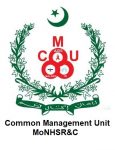National Health Policy 2001 - The Way Forward
The new Health Policy provides an overall national vision for the Health Sector based on “Health for All” approach. Under the new Health Policy, health sector investments are being viewed a part of the Government’s Poverty Alleviation Plan; priority attention has been accorded to the primary and secondary tiers of the health sector; and good governance is seen as the basis for health sector reforms to achieve quality health care.
The key to the success of the new Health Policy lies in its implementation. This is not an easy task but is by no means impossible. The new Health Policy has outlined implementation modalities and has set targets and a time frame for each of the key areas identified that would be implemented over a 10-year period. These have to be implemented in partnership between the federal Ministry of Health and the provincial Departments of Health, and in close collaboration with the district health set-up under the Local Government structure. The private health sector would also be taken on board while implementing the key policy initiatives.
THE HIV & AIDS PREVENTION, AND TREATMENT ACT, 2007 - Draft
An Act to prevent the HIV from becoming established amongst general population, particularly in most-at-risk and vulnerable populations, and to provide for the care, support and treatment of persons living with HIV and with AIDS.
WHEREAS, there is a need to prevent the HIV from becoming established general population, particularly in vulnerable populations; to provide for the care, support and treatment of persons living with HIV and AIDS; to protect vulnerable populations against stigma and discrimination on the basis of their HIV status; and to provide for increasing and scaling up prevention, care, support and treatment programs.
AND WHEREAS, discrimination on the basis of HIV status creates and sustains conditions leading to societal vulnerability for HIV infection.
AND WHEREAS, there is a need to reduce risk of HIV infection among vulnerable populations, including preventing its transmission into the general population;
AND WHEREAS, it is expedient to consolidate, amend, and enact a law to give effect to all the national and international endeavors in this respect; and to amend laws for the purposes hereafter. appearing
National HIV and AIDS Policy 2007 - Draft
HIV and AIDS poses a very real threat to the health of individuals, families and communities in Pakistan and to the progress we have made in recent years as a nation. Although we currently face a number of difficult challenges in our development, including conflict and natural disasters, paying insufficient attention to the warning signs presented by the growing HIV and AIDS epidemic in Pakistan could cost us dearly in the long‐term. Responding effectively to HIV and AIDS will require a co‐ordinated effort across a number of sectors. It will require us to confront difficult issues and to work with communities to come up with strategies that particularly suit our environment, our culture and our religious values. In doing this, we cannot afford to shy away from the issues that we find uncomfortable or challenging.
We will need to work to overcome the fear and misunderstanding associated with HIV and AIDS so that people with HIV and AIDS and families affected by HIV and AIDS can receive the treatment, care and support that they need. We can provide leadership in this area by ensuring that people affected by HIV and AIDS have access to all of the services and programs that are available to all the people of Pakistan, without stigma and discrimination. We can lead by example; by reaching out personally to people affected by HIV and AIDS and showing that we do not judge or fear them.
We will need to focus our HIV prevention efforts on the groups most affected by HIV and AIDS in Pakistan: injecting drug users and people who engage in sexual behaviour that puts them at risk. We will also need to find ways to work with our young people to help them to avoid risky behaviour and protect themselves from HIV. It is essential that we get the message of HIV to all people who need to hear it, not just in the towns and cities, but in the rural areas and in all corners of the country. To do this, we need to work with provincial and district governments, civil society, local communities and religious leaders to come up with a set of messages and services that people can identify with and find relevant. We also need to work with the groups that are marginalized within our communities, so that they can protect themselves and others. We particularly need to ensure that women in Pakistan can participate fully in protecting their health and the health of their families by being informed, educated and involved in the HIV and AIDS response at all levels, and that the cultural norms in our society that act as a barrier to this are removed.

Have a question or need some help?
APLHIV provides a respectful and safe venue where a wide range of organizations with differing missions come together to share HIV-related information. Call us now at 0800-22209

